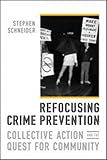Refocusing Crime Prevention : Collective Action and the Quest for Community / Stephen Schneider.
Material type: TextPublisher: Toronto : University of Toronto Press, [2007]Copyright date: ©2007Description: 1 online resource (368 p.)Content type:
TextPublisher: Toronto : University of Toronto Press, [2007]Copyright date: ©2007Description: 1 online resource (368 p.)Content type: - 9780802084200
- 9781442684768
- 364.4/30971133 22
- HV7431 .S359 2007
- online - DeGruyter
| Item type | Current library | Call number | URL | Status | Notes | Barcode | |
|---|---|---|---|---|---|---|---|
 eBook
eBook
|
Biblioteca "Angelicum" Pont. Univ. S.Tommaso d'Aquino Nuvola online | online - DeGruyter (Browse shelf(Opens below)) | Online access | Not for loan (Accesso limitato) | Accesso per gli utenti autorizzati / Access for authorized users | (dgr)9781442684768 |
restricted access online access with authorization star
http://purl.org/coar/access_right/c_16ec
Despite widespread concern over crime, public participation in local crime prevention programs is generally low and limited to a small, homogeneous group of middle-class home-owing residents. Conspicuously absent from these programs are the very people who are the most vulnerable to crime: the poor, immigrants, and visible minorities.Refocusing Crime Prevention explores the capacity of disadvantaged neighbourhoods to organize around local crime and disorder problems. Obstacles to the mobilization of communities around crime are strongly related to demographic and socio-psychological characteristics of residents, including low socioeconomic status and a lack of local social integration. Other obstacles stem from weaknesses in program implementation, such as inappropriate or ineffectual community outreach and communications, a lack of resources, and leadership voids. Many of these afore-mentioned barriers flow from broader structural factors, including politico-economic forces that spatially concentrate poverty, crime, and apathy; a culture of pervasive individualism, and a reliance on the welfare state for local problem solving.Using thorough ethnographic research, Stephen Schneider identifies, comprehensively details, and critically examines the many factors that obstruct public participation in community crime prevention programs, while formulating strategies and theories that attempt to empower disadvantaged and marginalized communities. Refocusing Crime Prevention will aid immensely in the struggle for crime reduction and safer neighbourhoods.
Mode of access: Internet via World Wide Web.
In English.
Description based on online resource; title from PDF title page (publisher's Web site, viewed 01. Nov 2023)


